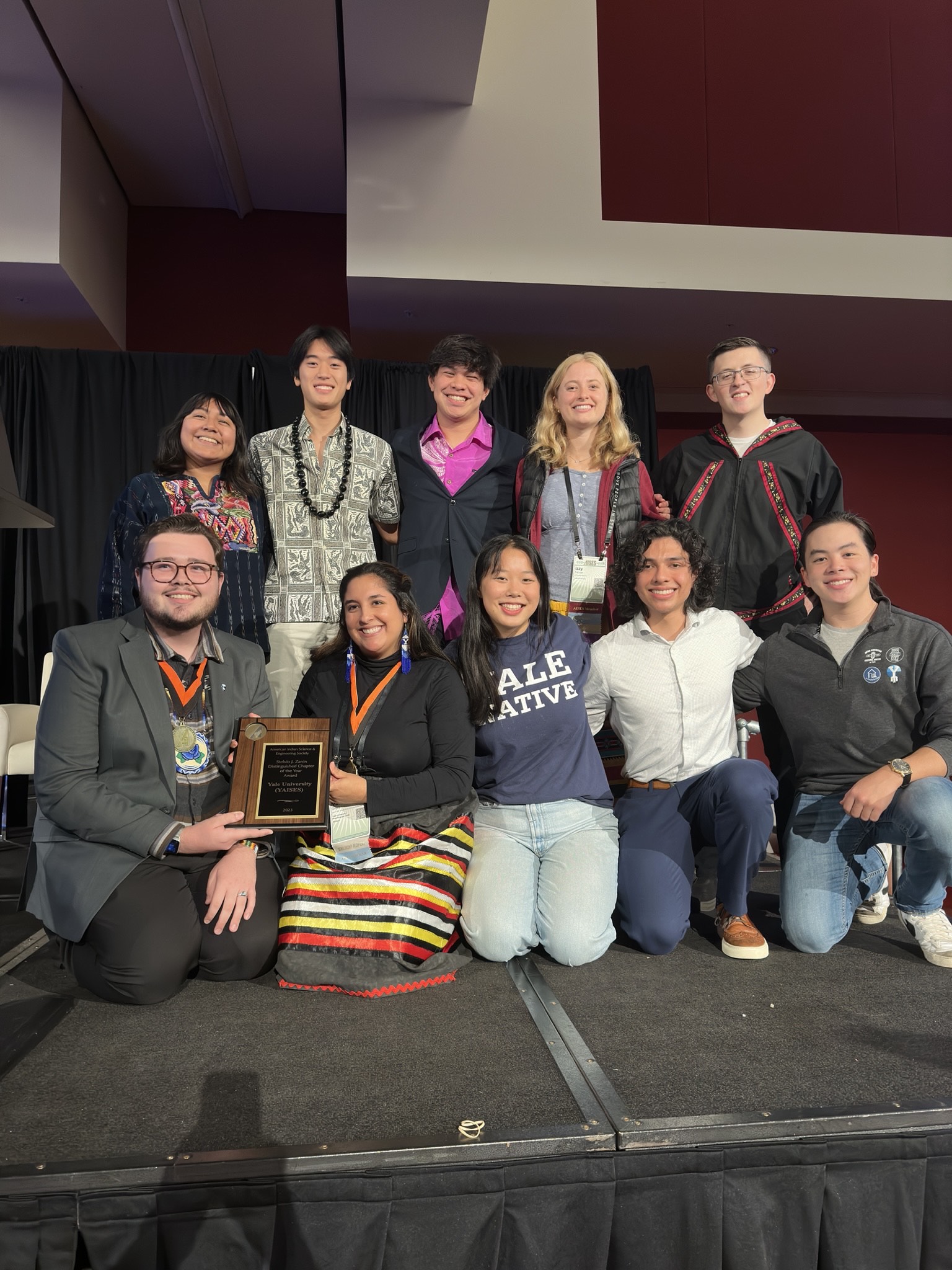Yale American Indian Science and Engineering Society chapter wins national award
Earlier this month, the Yale American Indian Science and Engineering Society won the Chapter of the Year award at the National AISES conference, recognizing Yale’s chapter as the one that best exemplifies excellence in STEM.

Courtesy of Madeline Gupta
The Yale Chapter of the American Indian Science and Engineering Society, or yAISES, recently won the Stelvio J. Zanin Distinguished Chapter of the Year Award at the National AISES conference hosted in Spokane, Washington. The award recognizes the college chapter of AISES that best exemplifies excellence in STEM through outreach, professional development, chapter recruitment and community service.
During the three-day national conference — which featured 196 college and university chapters, three tribal chapters, and 500 different STEM employers — AISES students met with internship recruiters, toured colleges and STEM industries in the local area and met with leading Indigenous figures in STEM.
The Yale chapter of AISES won first place in the conference’s Student Hackathon. The students created a Google browser extension that added chatbots to travel websites that recommend clean energy decisions related to tourism.
For current yAISES Co-Presidents Madeline Gupta ’25 (Sault Ste. Marie Tribe of Chippewa Indians) and Jordan Sahly ’24 (Eastern Shoshone), attending the national AISES conference felt like proof that being Indigenous and interested in STEM are not mutually exclusive.
“Something we focus on a lot is how science at its core is Indigenous, and Indigenous people were the first scientists on these lands — especially when it comes to waterways and taking care of the earth,” Gupta said.
For Kyra Kaya ’26 (Kanaka Maoli), attending the national conference was an important networking platform because it is one of the few opportunities where students get to interact with the Indigenous people in STEM.
Kaya said that the community has grown tremendously at Yale in the past years, but it is still a relatively small group relative to all of STEM at Yale.
Gupta told the News that she believes yAISES has existed for over a decade but dissolved in 2019 and did not resume during the COVID-19 pandemic.
In December 2021, however, Gupta and Mara Gutierrez ’25 (Diné/Navajo Nation) revived yAISES. Prospective data science and chemistry students, respectively, Gupta and Gutierrez said that they were motivated to restart an AISES chapter on campus after recognizing a dearth of Indigenous representation in their STEM courses and extracurricular activities.
Members of the organization say they have committed to promoting the visibility of Indigenous students in STEM — not only within the University community but also in the workplace.
“A lot of our work is really going off [the phrase], ‘you can’t be what you can’t see,’” Gupta said. “And so we try to connect our students with people that have done this and are successful in their careers and industries that have to do with STEM, whether it’s graduate school, or an industry job: making sure our students know that representation is out there and exists.”
To do so, yAISES also hosts speaker events in order to support their members’ professional development. Last year, the organization hosted a College Tea in collaboration with Morse College, featuring Larry Bradley who is involved in related anthropological and archaeological work.
yAISES meets every Friday at the Native American Cultural Center to plan community events. During these meetings, Sahly emphasized that yAISES members have shown a “strong commitment” to learning Indigenous approaches to science, ecology and environmental studies.
“Historically, Indigenous peoples were scientists and observed medicine and foodways — being Indigenous and STEM is something that’s always been a part of Indigenous culture,” said Matthew Makomenaw, director of the Native American Cultural Center.
This semester, yAISES also began working on college application outreach — especially in the wake of the United States Supreme Court decision that axed affirmative action. Called the “Branches Program,” the program matches undergraduates at the Native American Cultural Center to Indigenous high school students who are applying to colleges this year.
In addition to providing college application and essay writing assistance, yAISES provides support for students looking to pursue STEM undergraduate courses and professional development in higher education.
“For the up-and-coming scientists, who haven’t even really broken into our upper-level sciences, we can make sure that they make it all the way to upper-level education,” Sahly said. “And so our chapter has been really committed to how we can find these pathways into STEM, specifically at institutions of higher learning.”
Although yAISES members credited Yale for providing institutional funding — which allowed 10 members to attend the national AISES conference — members like Kaya believe that the organization is one of the only gateways for Indigenous students to interact with the sciences at Yale.
Gupta urged that the University hire more Indigenous faculty within the sciences, which she believes would provide additional institutional support to Indigenous STEM students.
“If you look towards Yale’s STEM departments, you’ll notice that they don’t tend to reflect the same [Indigenous] diversity that the humanities departments do broadly.”
yAISES will host its next College Tea on Pathways to Big Tech at Saybrook College on Nov. 13.
Correction, Dec. 7: This article has been updated to rewrite references to “NAISES conference” as “national AISES conference” and to correct two incorrect attributions.







